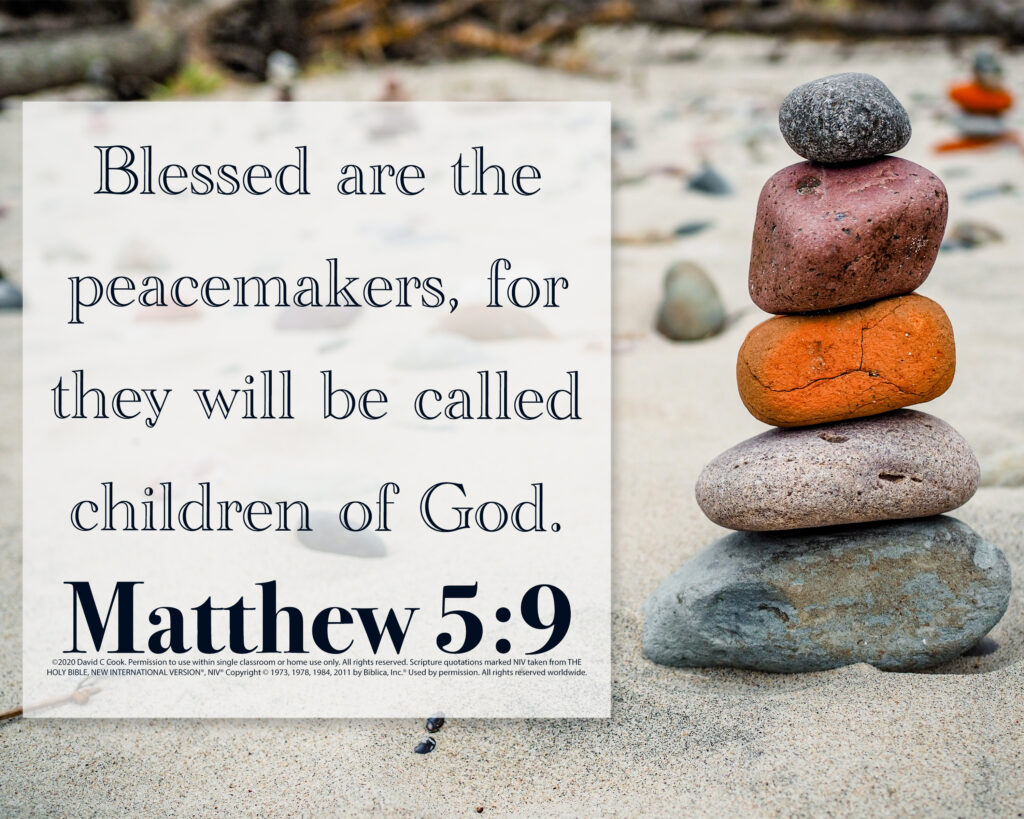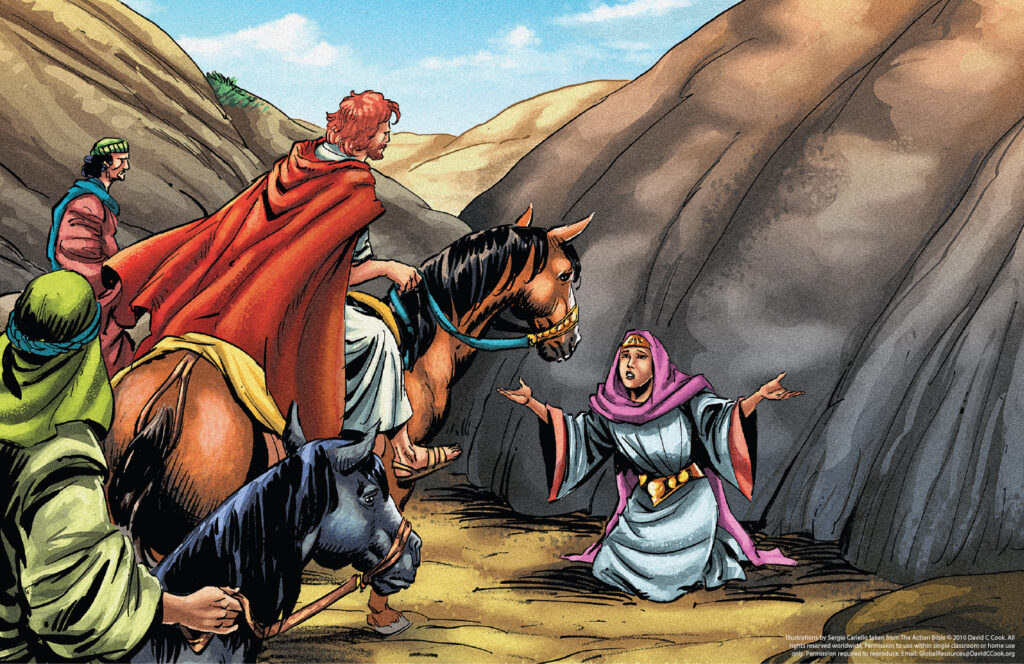During the lesson, the information for you to know is written in regular type, and what we suggest speaking or reading aloud to children is in bold. All resources for this lesson, including the Teacher Guide, Student Page, Family Connection Card, and other resources can be downloaded in a ZIP file by clicking on the following link:
In some lessons you will find "resource articles." These are articles written by experts from around the world to help equip you for your work with children and adolescents. Share them with parents or guardians if you consider it appropriate.
Blessed are the peacemakers, for they will be called children of God.
Matthew 5:9
Most of us want peace in our own lives, in our families, in our communities, and in our countries. But too often we experience discontent, disagreement, and conflict with others and even in our own hearts and minds. Though not all situations are within our control, we are called as much as possible to live peaceably with others. In fact, Jesus tells us that peacemakers are blessed to be called children of God. So how can we bring peace in a world that is anything but peaceful?
Think about how your own attitudes, choices, and behaviours disrupt peace in your life and the lives of those around you. What changes can you make to bring peace instead of conflict? Invite the Holy Spirit to show you where you need to change. Ask the Prince of Peace to fill you to overflowing. As God brings peace to your heart, you will begin to see it reflected in your words and your actions, and you will begin to understand why Jesus calls peacemakers the blessed sons of God.
Encourage the teens to ask their family members, “What makes you feel peaceful?” They can then share that true peace comes from God and that He can help to bring peace in situations of conflict or disagreement.
Teacher Tip: If possible, email or text the Family Connection Card to the families of your students.
Greet the teens as they arrive. Ask them if they had opportunities to show mercy in the past week. If possible, allow 2–3 teens to share their stories with the whole class. Remind them to describe situations but not to use names.
Divide the teens into groups of 5 students, and then explain the activity.
I will read a situation, and I will give you a few minutes to work together as a group to find a solution to the situation. Each group must agree on 1 solution to present to the whole class. Then the whole class will vote on whose solution is best.
Situation: The lead pastor of a nearby church has taken all of the church’s money, leaving the church community in chaos and disagreement about what to do. The members of your church offer to help the other church. What are the most important things to do? How will you accomplish them?
Give the groups 4–5 minutes to decide on their solutions. Give each group 2 minutes to present their solution to the whole class. Then ask the class the following questions:
Peacemakers are people who work to end conflict and restore broken relationships. The Bible teaches us that we are all called to be peacemakers. Let’s learn more about how and why we should be peacemakers in our families, our communities, and even our country.
Let me share some ways different organizations work as peacemakers. In many war-torn parts of the world, organizations bring people of different cultures together to create art. The goal of these organizations is to bring peace in areas of conflict by allowing people to work together to create something beautiful instead of fighting. As people work together to create murals, write and act out plays, write and perform songs, and make videos, they build relationships with those who were previously their enemies. Their work also informs people about the importance of peace.
Other organizations use civil disobedience and other nonviolent protests to raise awareness of the need for peace. Through their protests and their media campaigns, they work to bring peace and build relationships with those who disagree with them.
Though these organizations are seeking to do good, they often face danger. Many people in these regions do not support their efforts to bring peace. Yet these peacemakers continue working to bring peace.
All around the world, peacemakers work to bring peace in their families, communities, and countries. Their efforts are not always successful, but they continue to seek peace, even in situations of great danger.
Is peacemaking important? Why or why not?
Allow 2–3 teens to share their thoughts.
The Bible teaches us that peacemaking is important. In fact, Jesus said something very important about those who work to bring peace.
Have a student read Matthew 5:9 aloud from the Bible. If that is not possible, the verse is printed here.
If you are using the Memory Verse Poster, show it to the students.
Blessed are the peacemakers, for they will be called children of God.
Matthew 5:9

What do you think this verse means?
Allow 2–3 teens to share their thoughts. It is okay if they do not know the correct answer. They will learn more about this during the lesson.
Why would peacemakers be blessed by God?
Allow 2–3 teens to share their thoughts. It is okay if they do not know the correct answer yet.
In order to understand why peacemaking is important, we need to understand what causes conflict. Listen to what the Bible teaches us about fighting.
What causes fights and quarrels among you? Don’t they come from your desires that battle within you? You desire but do not have, so you kill. You covet but you cannot get what you want, so you quarrel and fight. You do not have because you do not ask God. When you ask, you do not receive, because you ask with wrong motives, that you may spend what you get on your pleasures.
James 4:1–3
What does this passage say are the causes of quarrels and fighting?
Allow 2–3 teens to share their thoughts. Then guide them to understand that sinfulness and selfishness are the causes of conflict. Often fear is a root cause of conflicts between different people groups. These things cause separation in our relationship with God and keep us from receiving the good things God has for us.
Do you think this is true? Why or why not?
Allow 2–3 teens to share their thoughts.
Listen to a story about a peacemaker in the Bible. As we read the story, listen for what she did to bring peace in a situation of conflict.
Optional: If possible, share the images from The Action Bible.


There was a rich man named Nabal who was harsh and badly behaved. He had a beautiful and discerning wife named Abigail. David, the one God had chosen to become king, was hiding in the wilderness because Saul, the current king, wanted to kill him. David was traveling near Nabal’s land and was in need of supplies, so he sent 10 of his men to greet Nabal. Listen to what David told the young men to say:
Long life to you! Good health to you and your household! And good health to all that is yours! Now I hear that it is sheep-shearing time. When your shepherds were with us, we did not mistreat them, and the whole time they were at Carmel nothing of theirs was missing. Ask your own servants and they will tell you. Therefore be favorable toward my men, since we come at a festive time. Please give your servants and your son David whatever you can find for them.
1 Samuel 25:6–8
Do you think David’s greeting was peaceable? Why or why not?
Allow 2–3 teens to share their answers.
Listen to how Nabal responded.
Nabal answered David’s servants, “Who is this David? Who is this son of Jesse? Many servants are breaking away from their masters these days. Why should I take my bread and water, and the meat I have slaughtered for my shearers, and give it to men coming from who knows where?”
1 Samuel 25:10–11
Listen to what happened next.
David’s men turned around and went back. When they arrived, they reported every word. David said to his men, “Each of you strap on your sword!” So they did, and David strapped his on as well. About four hundred men went up with David, while two hundred stayed with the supplies.
1 Samuel 25:12–13
Both David and Nabal chose not to be peaceful. But God brought a peacemaker to help to resolve their situation. Nabal’s wife, Abigail, heard what had happened between her husband and David. So she made a plan to resolve the conflict. She gathered food, wine, and gifts and rode out on a donkey to meet David. Listen to what she said:
When Abigail saw David, she quickly got off her donkey and bowed down before David with her face to the ground. She fell at his feet and said: “Pardon your servant, my lord, and let me speak to you; hear what your servant has to say.”
1 Samuel 25:23–24
Listen to what David did:
David said to Abigail, “Praise be to the Lord, the God of Israel, who has sent you today to meet me. May you be blessed for your good judgment and for keeping me from bloodshed this day and from avenging myself with my own hands. Otherwise, as surely as the Lord, the God of Israel, lives, who has kept me from arming you, if you had not come quickly to meet me, not one male belonging to Nabal would have been left alive by daybreak.” Then David accepted from her hand what she had brought him and said, “Go home in peace. I have heard your words and granted your request.”
1 Samuel 25:32–35
Here are some things Abigail did that can help us to be peacemakers, too.
Choose kindness and humility. When someone offends you or reacts in anger, choose to respond calmly and with kindness. Accept responsibility when it is appropriate, even if you do not feel the whole situation is your fault. Though you may not be able to prevent a quarrel, you can at least help to make it less serious.
Talk about it. Ignoring conflict does not make it go away. Try to speak respectfully as you share your viewpoint and listen carefully to what the other person is saying.
Ask for help. If necessary, ask a trusted adult for advice or invite that person to be part of the conversation. Sometimes a person who is not directly involved in the conflict can help to bring wisdom and peace.
Work to heal instead of hurt. In times of conflict, we often focus on doing what we believe is right instead of thinking about how we can heal the relationship. Whenever possible, consider how you can bring peace to the relationship—even if it means that sometimes things do not work out the way you want them to. If others are arguing, think about what you can do to help bring healing to that broken relationship. When we do this, it brings glory to God.
Pray. Ask God to help you to be a peacemaker instead of the cause of conflict. Ask Him to reveal the areas of your life where you may be creating conflict with others. Ask Him to give you wisdom to handle those things better. Thank Him for the times He has helped you to make peace. You can also ask God to heal the divisions caused by disagreements. God has the power to bring peace in any situation, no matter how difficult.
Though we can work to bring peace into our own lives and the lives of those around us, God is the source of peace, and He is the only one who can bring true peace. Jesus died in order to bring us peace with God. When we share that message with others, we are peacemakers. Listen to what Jesus taught about peace:
Peace I leave with you; my peace I give you. I do not give to you as the world gives. Do not let your hearts be troubled and do not be afraid.
John 14:27
How could the peace that Jesus offers help in situations of disagreement or conflict?
Allow 2–3 teens to share their thoughts. Then guide them to understand that God’s peace can overcome all conflict, as His is the only true peace.
We can choose to be peaceable in our own lives, and we can help to bring peace to the lives of others. When we share God’s love and live in ways that reflect His peace, we can help others to understand that peace is better than conflict. When we work to bring peace in our own lives and the lives of those around us, we have an opportunity to see God at work. He can bring peace in even the most difficult situations.
Divide the teens into groups of 3–4. Read the situations aloud and ask them to discuss how they would respond using the ideas they learned.
Give the teens 3–4 minutes to discuss each situation. Then allow 2–3 teens to share their ideas with the whole class. After each situation, ask the following questions:
Which of these situations was the most peaceable? Why?
What are some other ways to be a peacemaker in this situation?
Optional: If you are using the Student Pages, the teens can complete the activity on their pages.

God has called us to be peacemakers and to live peaceably with others. Listen to this verse:
If it is possible, as far as it depends on you, live at peace with everyone.
Romans 12:18
Have the teens share their answers with their groups.
How can you apply this principle to your own life?
How can you apply this principle to help to bring peace in the lives of those around you?
Give the teens 3–4 minutes to discuss their answers with their groups. Then close with a blessing based on John 14:27 and Romans 12:18:
Blessing: May the God of peace be with you, and may He fill you with His peace. May He help you to bring peace to the lives of those around you as you share His love with others.
Lead the students in singing this quarter’s song, if possible
Life on Life ©2020 David C Cook. Reproducible for home or classroom use only. All other uses require written permission from David C Cook [email protected]. All rights reserved.